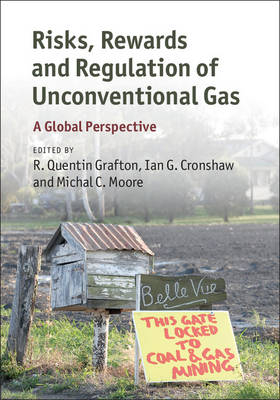
Risks, Rewards and Regulation of Unconventional Gas
Cambridge University Press (Verlag)
978-1-107-12008-2 (ISBN)
The global energy transition from carbon-intensive to renewable fuels has increasingly demanded a better understanding of the causes and consequences of the rapid development of unconventional oil and gas. Focusing on key countries including the United States, Canada, China, Argentina, the United Kingdom and Australia, this book consists of case studies and in-depth analyses that weigh up the risks and rewards at regional, national and global scales. Explaining how and why unconventional fuels are transforming the global energy landscape, the strengths, weaknesses, opportunities and threats are explored through a political, economic and governance-based perspective. Emphasis is placed on how to regulate the industry, encompassing local issues, stakeholder engagement and the social licence to operate. The new baseline studies and standards introduced in this book provide a timely insight into the trade-offs across the social, economic and environmental domains, making this ideal for researchers and policymakers in energy fields, and for graduate students.
R. Quentin Grafton is Professor of Economics at the Australian National University (ANU), Director of the Centre for Water Economics, Environment and Policy (CWEEP) at the ANU, and holds the UNESCO Chair in Water Economics and Transboundary Water Governance. He served as Chief Economist and Foundation Executive Director of the Australian Bureau of Resources and Energy Economics (2011–13). He has published more than 120 scholarly articles in some of the world's leading journals in economics and the life sciences, and has edited or co-authored 15 books. Ian G. Cronshaw worked as Division Head at the International Energy Agency (Paris) between 2005 and 2011, where he was responsible for analysing global gas, coal and power developments. He was the principal author of the Agency's Medium-Term Gas Market Outlook in that period. Since then he has worked for the International Energy Agency as a consultant on the annual World Energy Outlook, and reports such as 'Are We Entering a Golden Age of Gas?' and 'Golden Rules for the Golden Age of Gas', publications highlighting the growing importance of unconventional gas and approaches to regulation, both viewed from a global perspective. Michal C. Moore is Professor of Energy Economics at the School of Public Policy, University of Calgary, where he teaches classes in microeconomic theory, decision analysis and energy technologies. He is also visiting Professor of Economics and Systems Engineering at Cornell University, New York. He is a former Chief Economist for the US National Renewable Energy Laboratory in Golden, Colorado. His current research focuses on energy market regulation and a pan-North American energy strategy.
Foreword; Preface; Acknowledgements; 1. The rise of unconventional gas: the story so far Ian Cronshaw, R. Quentin Grafton and Michal Moore; 2. Geopolitical dimensions of global unconventional gas perspectives Frank Umbach; 3. Unconventional gas development in Asia-Pacific: looking for common ground Juan Roberto Lozano-Maya; 4. Unconventional hydrocarbons and the US technology revolution Martin Evans; 5. Risks and opportunities of unconventional natural gas: Australia and the United States Ian Cronshaw and R. Quentin Grafton; 6. Economics of shale gas in the United States Francis O'Sullivan; 7. Unconventional natural gas in China LV Jianzhong and Zhang Huanzhi; 8. The Argentina approach for developing unconventional gas resources Luis Stinco and Silvia Barredo; 9. Unconventional gas in the United Kingdom Michael Bradshaw; 10. Alberta natural gas: landlocked largesse Michal Moore; 11. Managing the regulatory risk of unconventional natural gas Michal Moore; 12. Regulation of unconventional gas in Colombia Ana Cristina Sánchez-Thorin and Orlando Cabrales; 13. Regulation of unconventional gas in India Vijay Kelkar and Rahool Panandikar; 14. Failure to frack: pitfalls of governance and risk in Polish shale gas Michael Carnegie LaBelle; 15. Unconventional gas regulation in Australia and the US: case studies of four jurisdictions Ian Cronshaw and R. Quentin Grafton; 16. Regulation of unconventional hydrocarbons in Alberta, Canada Michal Moore; 17. When unconventional becomes conventional: regulation of natural gas development in British Columbia, Canada Paul Jeakins; 18. Leading practice regulation for unconventional reservoir development in South Australia Barry Goldstein, Michael Malavazos and Belinda Hayter; 19. Best practice for community engagement: determining who and what is at stake? Peta Ashworth; 20. Managing the impact of coal seam gas water extraction in the Surat basin Randall Cox; 21. Whole of landscape assessment and planning in the management of unconventional natural gas exploration and production in Australia John Williams, Ann Milligan and Tim Stubbs; 22. Unconventional energy in British Columbia: a post-Tsilhqot'in view William Nikolakis; 23. Fugitive emissions from coal seam gas production Stuart Day; Appendix; Glossary; Index.
| Erscheinungsdatum | 07.05.2017 |
|---|---|
| Zusatzinfo | 39 Tables, black and white; 56 Halftones, black and white; 63 Line drawings, black and white |
| Verlagsort | Cambridge |
| Sprache | englisch |
| Maße | 180 x 254 mm |
| Gewicht | 1170 g |
| Themenwelt | Naturwissenschaften ► Biologie ► Ökologie / Naturschutz |
| Recht / Steuern ► EU / Internationales Recht | |
| Technik ► Bergbau | |
| Technik ► Elektrotechnik / Energietechnik | |
| ISBN-10 | 1-107-12008-X / 110712008X |
| ISBN-13 | 978-1-107-12008-2 / 9781107120082 |
| Zustand | Neuware |
| Haben Sie eine Frage zum Produkt? |
aus dem Bereich


